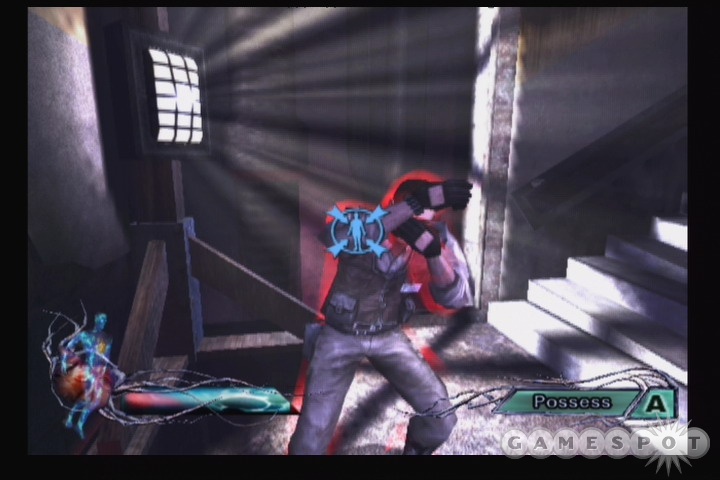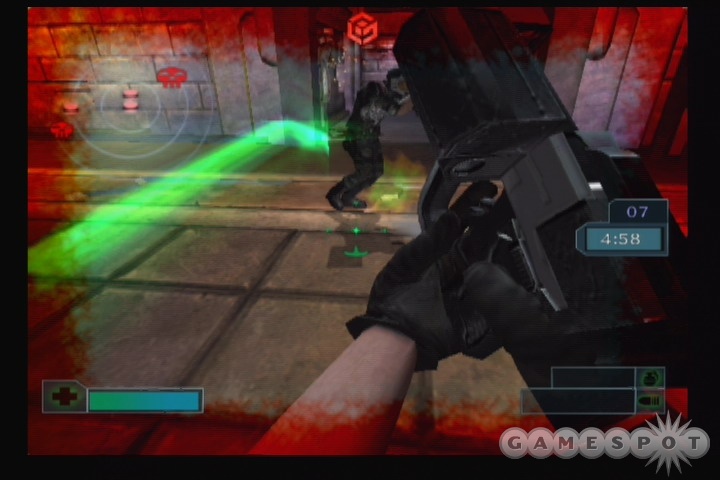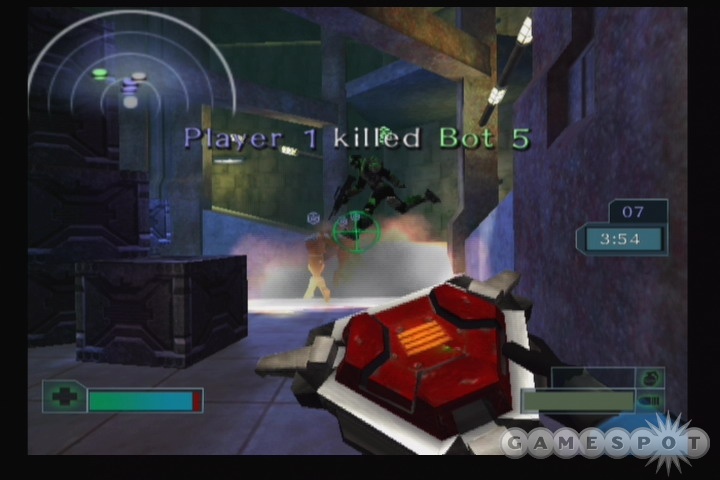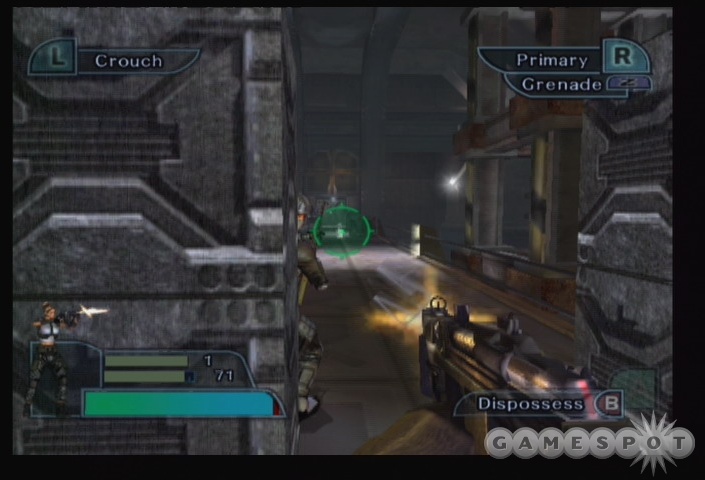If you've never had an out-of-body experience before, you could always try Geist, a first-person-perspective action adventure exclusively for the GameCube. In the game, your character's spirit is ripped from his body, leaving you to explore a high-tech, heavily guarded compound as an invisible being capable of possessing other living creatures--and even certain objects. This unique premise sets up some unusual situations and some cleverly designed puzzles as you infiltrate your enemies' ranks by borrowing their bodies and walking among them. Since much of your time is spent occupying the personal space of armed guards, though, much of the game plays out like a standard first-person shooter. The game's ghostly twist is also central to its multiplayer mode, which can be played with or without computer-controlled opponents and teammates. Geist's graphics and sound aren't that remarkable by current standards, and despite its long time spent in development, it's got some obvious rough edges. So its finer points aren't right there on the surface. And maybe that's befitting a game about an invisible man.

The man in question is John Raimi, a scientist called in with a special forces unit to declaw the Volks Corporation, located somewhere in France. Much like Half-Life's Black Mesa research facility, Volks is a high-tech subterranean laboratory in which dangerous, barely controllable top secret experiments are taking place. In short, Volks is up to no good, so Raimi and company storm in to get their hands on incriminating evidence. But the ambush doesn't go according to plan. Soon Raimi finds himself separated from his squad, becoming the next subject of Volks' nefarious agenda. He's turned into this disembodied, energy-based life-form...and, by some chance, he's then able to escape the elaborate containment system designed to prevent him from running amok. Now it's payback time, and Raimi can see to it that his enemies don't even know what hit them.
It's a good thing there's more to Geist than first-person shooting. In the first few minutes of the game, a shoot-out erupts, and Raimi runs around blasting foes with a handgun while they whittle away at his health bar with their automatic rifles. Your enemies crumple like rag dolls when killed, and don't do much to try to avoid getting shot, so they don't make for particularly challenging opponents. The game's controls are a little sluggish, and the frame rate tends to noticeably bog down during battles, so Geist's first big action sequence falls flat. Fortunately, it's not long before you're transformed into a ghost, and the game gets considerably more interesting from there. Geist's single-player adventure is fairly short and should take you maybe 10 hours or fewer to complete, but it's got a good amount of variety. There's quite a bit of shooting, including more than a few battles against thick-skinned boss opponents. The nature of the action changes considerably depending on the host you possess and whatever weapon he or she happens to be carrying. You'll also get to possess everything from animals to conventional appliances while finding your way around Volks Corp. and uncovering the intentions of its eccentric leader.
As a ghost, you might expect you'd have free reign to wander the halls of Volks however you please. However, your new "body" has certain limitations. You can't pass through solid walls unless there's a noticeable gap in them allowing you to slip through. Volks has also set up certain defenses, preventing you from floating around unhindered. To make matters worse, your health constantly dwindles away and can only be restored by possessing a host or drawing energy from plants you'll find here and there. In practice, there's little danger in running out of health when in ghost form, but your limited life force puts a little pressure on you to keep moving forward. Occasionally you might get stumped by a puzzle and find yourself searching for where you need to go next. But between the game's linear structure and your access to a 3D map of your surroundings, it shouldn't be long before you figure out your next move.

Geist's linear design helps ensure that the action remains reasonably well-paced, though it also makes a lot of the game's puzzles really simple. It's great that the game lets you possess both living creates and inanimate objects. However, you'll soon learn that pretty much the only inanimate objects the game lets you inhabit are the ones that help you get past an environmental obstacle of some sort. So you won't need to think much about why you're possessing that pile of dishes or that fuse--you'll do it because you can. One of the game's conceits is that, before possessing a living host, you must first weaken its mental defenses by scaring the living daylights out it. You'll do this by possessing computers, ladders, telephones, and more. The results of these freak-out sequences are sometimes creepy and sometimes amusing, but they're completely scripted. You'll wonder how the game might have been different if it gave you more freedom to accomplish your objectives rather than put you in a string of contrived situations, each with very specific solutions.
Though the game frequently leads you by the nose, Geist definitely has its moments. At one point, Raimi finds himself in a women's locker room (no, it's not the first place he goes as soon as he realizes he's invisible). At another point, he must possess the body of an animal handler who has a real way with ill-tempered, stubborn mutts. Some of the later puzzles are pretty decent, too, and the action also gets better as the game gradually accepts that you've come to grips with the basics. The late-game battles are some of the best parts of Geist. You'll need to use your ghostlike abilities to suppress difficult odds, such as by frequently switching between hosts in the middle of a firefight, causing your foes to fire on one another in panic. Since the world seems to move in slow motion as you travel around in ghost form, it can be exciting to watch your foes caught up in the chaotic instant. And just when you think you're unstoppable...well, you'll find out. While the world of Geist isn't so detailed or open-ended that you can really lose yourself in the experience, the game at least succeeds at keeping you guessing, and it compels you to keep pressing on until the climactic conclusion.

Geist's multiplayer portion is subject to the same relative strengths and weaknesses as the rest of the game. That is, it makes up for its fairly standard look and feel with some distinguishing features. Multiplayer is split up into different modes of play: possession deathmatch, capture the host, and hunt. All three center on the game's possession mechanics. In deathmatch, your weapons are dependent on which host you possess. Geist has a good selection of different weapons in it, so this is a decent deathmatch mode with a twist. Capture the host works well as a team-based variant, where you try to possess a host and then safely get to a strategic point. Kill some foes along the way and you'll score bonus points when you get there. Hunt is a ghosts-versus-humans match in which ghosts must possess their human opponents and force them into environmental hazards, like pits or fans, while the humans must use their slow-loading antispirit pistols to immobilize and dispatch their ethereal enemies. Each of these modes has a different tone to it, so it's difficult to decide which is best. Hunt is the most unusual, but all tend to be action-packed, partly due to the rather small maps.
Geist supports four players in split-screen matches, but you can have up to eight characters running around in a match by padding it out with computer-controlled extras. The ability to play with bots is definitely nice to have, and multiple difficulty settings for the bots make them suitable competition for players of various skill levels. There are numerous other options you can tweak to customize your multiplayer sessions, and you can also unlock additional maps and characters by finding hidden secrets strewn through the single-player adventure. Overall, Geist's multiplayer mode is a solid addition to the game.

Sometimes Geist looks rather impressive, but at other times it's choppy and slow, making the game look dated and uneven. The sum total is still a fine-looking GameCube game that features some fairly expressive characters, lots of pretty-looking atmospheric lighting effects, and considerably detailed environments. There also aren't many interruptions to the action, as loading times during the single-player portion are thankfully infrequent--until you die, anyway, at which point Geist has the annoying habit of prompting you to save your progress before taking several long seconds to load your last saved point. All the while, Geist's audio is good but unremarkable. Weapon effects are a little subdued, and most of the dialogue is spelled out in onscreen text, while the portions of it that are delivered in full speech are of mixed quality. The soundtrack cues up fairly well to what's happening in the game, and it helps reinforce both the suspenseful and action-packed portions of the plot.
By now, the first-person shooter is probably the single-most-played-out style of gaming around. So many games have pushed this style of gaming to the limits, and so many more have fallen short of the mark, that it's difficult for any such game to stand out anymore. Geist at least serves as an important reminder that an original game design and a first-person perspective aren't mutually exclusive. The shooter portions of Geist aren't all that special, but there's a lot more to this game than meets the eye.